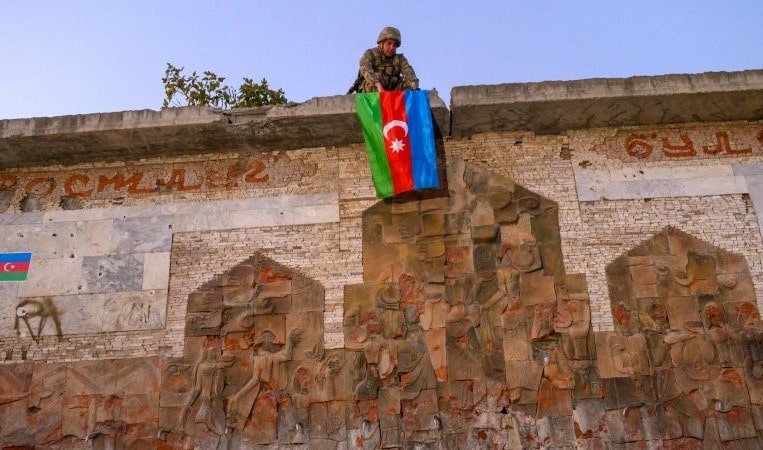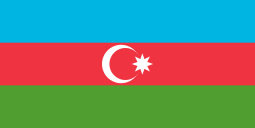
The Telegraph: Azerbaijan retakes enough land in Nagorno Karabakh war to resettle 500,000 Azerbaijanis
05 November 2020
By Colin Freeman
(CREDIT: AFP/An Azerbaijani soldier hangs the flag of Azerbaijan in the city of Jabrayil, where Azerbaijani forces regained control during the fighting with Armenia over the breakaway region of Nagorno-Karabakh on October 16, 2020)
Recapture of four Armenian-held districts will allow a mass return of ethnically cleansed Azerbaijanis, top Azerbaijani official tells Telegraph.
Azerbaijan has liberated enough land in its war with Armenia over Nagorno Karabakh to rehouse up to half a million displaced Azerbaijani, a senior government advisor has said.
Hikmet Hajiyev, the chief foreign policy aide to Azerbaijan's President Ilham Aliyev, told the Telegraph that Azerbaijani forces had now retaken four key territories during the five-week long war.
It means that up to 500,000 Azerbaijani citizens could eventually return to the area, Armenian forces seized which in the early 1990s when Nagorno Karabakh broke away from Azerbaijani control.
"We are talking about a substantial region that has been retaken, and a potentially substantial number of people being able to return to their homes once the conflict is finally over," Mr Hajiyev said. "For nearly 30 years we have been waiting for the return of these territories. There is a lot of building and de-mining work that will have to be done, but every village that is retaken is a success for the Azerbaijani people."
Mr Hajiyev's claims come amid growing signs that Azerbaijan is prevailing in the war against Armenia, thanks partly to new drone weaponry that has given it superiority over Armenian tank defences in Nagorno Karabakh and surrounding Armenian-occupied buffer zones.
Over 100 Armenian tank positions are believed to have been destroyed, while Armenia has said it has lost over 1,000 troops. Azerbaijan has not disclosed military casualty figures. Azerbaijan now claims to have control of four districts previously under Armenian control - Gubadli, Fizuli, Zangilan and Jabrayil.
The area includes up to 200 towns and outlying villages, although many are long-abandoned settlements that lie on the frontline of the conflict zone. Mr Hajiyev alleged that Armenian forces had deliberately destroyed some of them as they retreated.
"They have operated a kind of scorched earth policy, destroying these places completely," he said. "In Fuzuli, for example, our troops looked for a building to plant a flag on when they retook it, but could find nowhere that was not already flattened."
Up to 700,000 Azerbaijanis fled Armenian-dominated Nagorno Karabakh during the conflict in the early 1990s. Most now live all over Azerbaijan, but Mr Aliyev is keen to repatriate them.
He points out that Nagorno Karabakh is still recognised internationally as Azerbaijani territory, and argues that the recent military action is legitimate after years of stalled diplomatic efforts by Russia, France and the US. He has also vowed to carry on the military campaign into the heart of Nagorno Karabakh unless Armenian troops pull out, which Armenia's government is refusing to do.
In an olive branch to Nagorno Karabakh's 150,000 population - who today are nearly all ethnic Armenians - Mr Hajiyev said that life in Nagorno Karabakh would improve if it returned to Azerbaijani control. Rather than being a conflict-torn statelet in diplomatic limbo, he said, it could embrace peace and prosperity and enjoy the fruits of Azerbaijan's oil wealth.
"Regardless of Armenian propaganda, the people of Nagorno Karabakh live in lousy conditions - they also have huge a demographic problem, whereby their young people are leaving," he said.
"I know reconciliation will not be easy, and it will require a lot of effort to persuade them that Azerbaijan is not the enemy, but we are ready to bring investment and soft power to this region. Azerbaijan is a multi-cultural society - there are Armenians living elsewhere in our country with no problems at all."
04.11.2020












